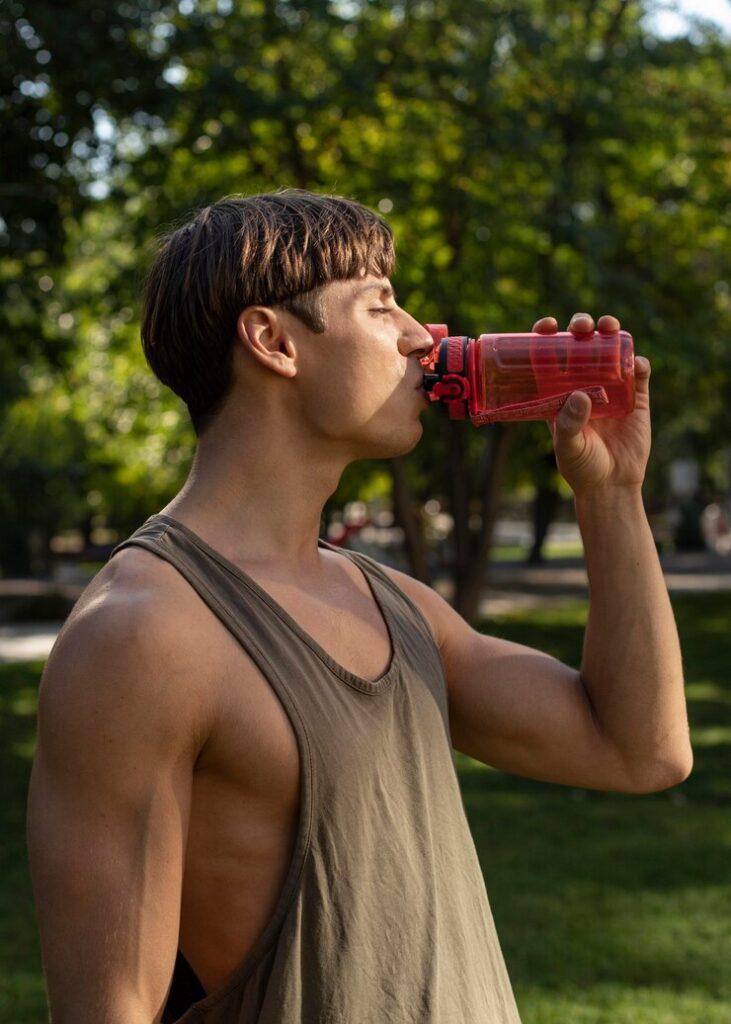What You Should Know –

When you reach for an energy or sports drink to keep you going at the gym, it’s easy to think it’s a quick fix. But these drinks have some distinct differences, both in ingredients and effects on your body. Sports drinks like Gatorade and Powerade claim to hydrate and replenish electrolytes, while energy drinks like Celsius, Bang, and Monster promise to increase energy and alertness.
But is that can-jumping doing you more harm than good?
Let’s break it down.
The roots of energy and sports drinks go back to addressing specific needs for hydration and energy. Sports drinks were born in the 1960s when a team of scientists developed Gatorade to help football players at the University of Florida stay hydrated and conserve energy during tough games. This drink quickly gained popularity among athletes due to its combination of water, electrolytes, and sugar, setting the standard for modern sports drinks.
On the other hand, energy drinks entered the market in the late 20th century. The Red Bullintroduced in Austria in the late 1980s, it was inspired by a Thai drink designed to combat fatigue. Red Bull’s mixture of caffeine, taurine, and sugar quickly became popular around the world, marketed not only to athletes but also to professionals looking for mental and physical stimulation.
Over the past decades, energy and sports drinks have evolved into multi-billion dollar industries, with products now designed for a variety of lifestyle and exercise needs.
Energy drinks they contain stimulants like caffeine and sugar for a quick burst of energy but often lack nutrients, leading to potential side effects. In contrast, sports drinks focus on hydration, electrolytes, and carbohydrates to fuel and restore your body during prolonged exercise. But even sports drinks aren’t as straightforward as they seem—they can contain sugar and artificial flavors that can add unnecessary calories without any real nutrition.
Sports drinks like Gatorade and Powerade claim to hydrate and replenish electrolytes, while energy drinks like Celsius, Bang, and Monster promise to increase energy and alertness. Each type of drink is designed with a different purpose in mind: sports drinks aim to conserve water and replenish nutrients lost through sweating, especially during long-term or high-intensity physical activities. These drinks are often enriched with electrolytes such as sodium and potassium and may include carbohydrates to restore energy levels.
Energy drinks primarily focus on stimulating the nervous system with ingredients such as caffeine, taurine, and sugar, which provide a quick boost of energy and mental alertness. However, the overlap in their marketing often blurs the lines, with many people consuming them interchangeably, which can lead to misuse or overuse. Understanding these differences is key to choosing the right drink to support your exercise goals without jeopardizing your overall health.

Most energy drinks are loaded with caffeine, usually around 70-240 mg per canmore than a cup of coffee. Here’s what happens:
- Short Term Benefits: Caffeine and sugar provide instant energy, sharpen focus, and improve alertness, making it easier to fuel through exercise. Some energy drinks contain additional vitamins, such as B12, which can help with energy use.
- Long Term Benefits: Occasional use of energy drinks may be helpful for extra push during intense training sessions, but experts advise to keep them in moderation to avoid relying on artificial energy boosts.
Although they provide that temporary boost, energy drinks come with significant health drawbacks.
- Short Term Problems: Overuse can lead to headaches, sweating, anxiety, and elevated heart rate. Excess caffeine, especially with sugar, can disrupt sleep cycles, leading to fatigue after the initial “buzz” wears off.
- Long Term Damage: Regular consumption of energy drinks has been linked high risk of cardiovascular problemsincluding heart palpitations and high blood pressure. Some studies also suggest a link to anxiety disorders, weight gain from high sugar levels, and even tooth decay.
Here is a table comparing the most popular energy drinks:
| An energy drink | Caffeine (mg) | Sugar (g) | Calories | Notable Ingredients |
|---|---|---|---|---|
| Celsius | 200 | 0 | 10 | Green Tea Extract, B Vitamins |
| The Red Bull | 80 | 27 | 110 | Taurine, B vitamins |
| A monster | 160 | 54 | 210 | Ginseng, Taurine |
| Bang | 300 | 0 | 0 | Super Creatine, CoQ10 |
Sports drinks are made rehydrate and replenish electrolytes. They are useful during long, sweaty workouts when you lose a lot of salt and water. Here is the breakdown:
- Short Term Benefits: These drinks hydrate quickly and help replenish electrolytes such as sodium and potassium, which your body loses through sweating. The carbohydrates in sports drinks provide a quick source of energy, which helps maintain performance in endurance activities.
- Long Term Benefits: When used correctly, sports drinks can be a valuable tool for athletes engaged in long, intense activities, supporting hydration and helping to prevent muscle cramps and fatigue.
The sugar content of some sports drinks can make them less than ideal, especially if they are consumed outside of strenuous exercise.
- Short Term Problems: Drinking sports drinks without the need to rehydrate can lead to unnecessary sugar intake, causing blood sugar levels to rise. Some drinks also contain artificial colors and flavors that can cause digestive discomfort in some people.
- Long Term Damage: Regular use, especially without intense exercise, can lead to weight gain, blood sugar imbalances, and an increased risk of type 2 diabetes.
| Sports Drink | Calories | Carbohydrates (g) | Sodium (mg) | Potassium (mg) | Sugar (g) |
|---|---|---|---|---|---|
| Gatorade Thirst | 140 | 36 | 270 | 75 | 34 |
| Powerade | 130 | 34 | 150 | 40 | 34 |
| DayLyte | 0 | 0 | 50 | 150 | 0 |
| Nuun Performance | 60 | 15 | 360 | 210 | 13 |
If you’re looking for a natural way to stay hydrated and energized, here are some healthy options:
- Coconut water: Known as the “natural sports drink,” coconut water is rich in potassium and sugar.
- Fruit Infused Water: Adding slices of fruit like lemon, berries, or cucumber provides subtle flavor and vitamins without added sugar.
- Green Tea: With moderate levels of caffeine and antioxidants, green tea is an alternative that offers a slight boost without the downside of energy drinks.
- Beet juice: Research shows that beetroot juice can improve endurance by increasing nitric oxide levels, which helps blood flow.
- Homemade Electrolyte Drinks: Mixing water with a pinch of sea salt, lemon juice, and a teaspoon of honey creates a simple and effective electrolyte drink.
To make an informed decision, think about why you reach for a particular drink. If you are an endurance athlete or train in extreme heat, a sports drink can be beneficial in moderation. For a quick upgrade, think green tea or coffee rather than energy drinks loaded with sugar. And remember, your body’s natural state thrives with a complete, nutritious diet and adequate hydration.
Key Takeaways:
- Energy drinks can be helpful in moderation for short-term focus, but they pose long-term health risks if consumed in excess.
- Sports drinks are often beneficial for intense, long-lasting performance but should be avoided as a regular drink due to their high sugar content.
- Natural alternatives provide the same benefits without additives, making them a safe, healthy choice for many people.
Ultimately, whether you choose an energy drink, a sports drink, or something natural, the key is balance and purpose. Drink smart, stay hydrated, and keep your body’s health in mind as you push your limits in the gym.




